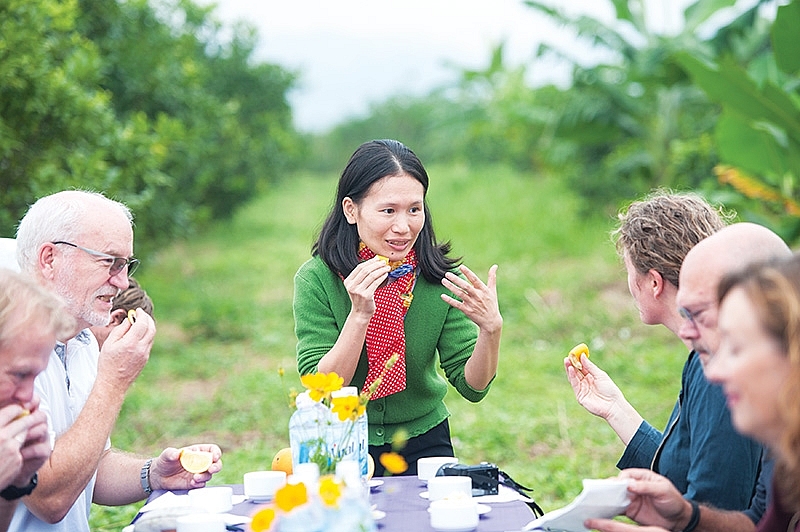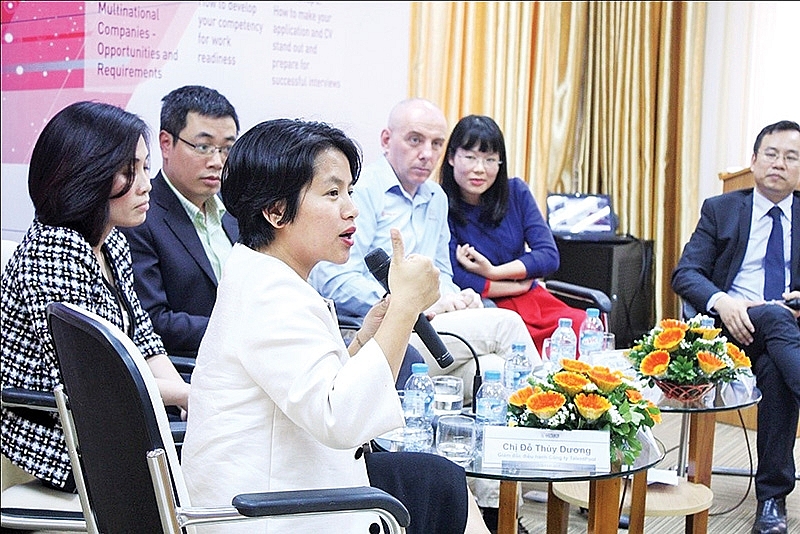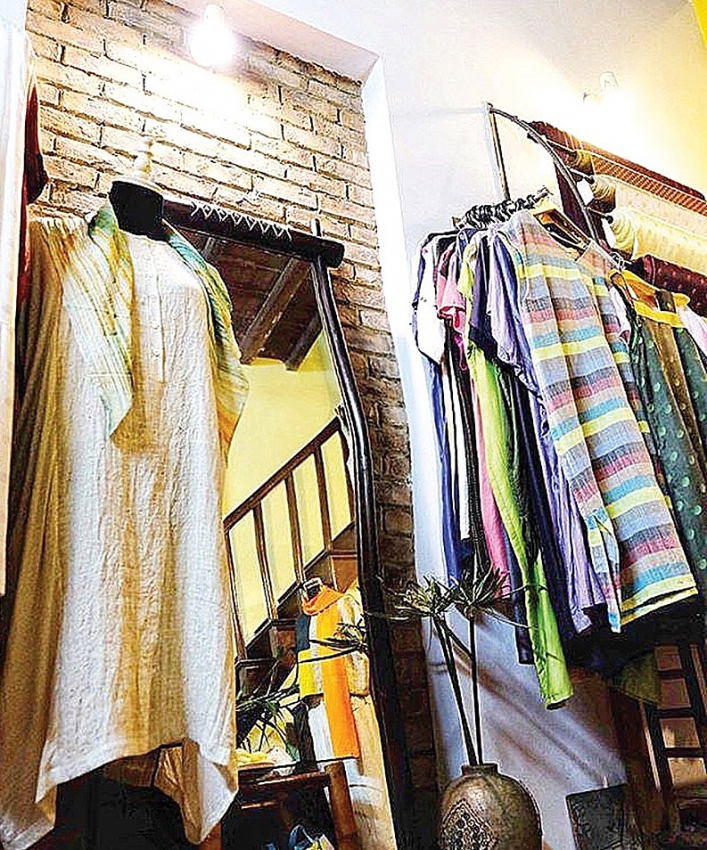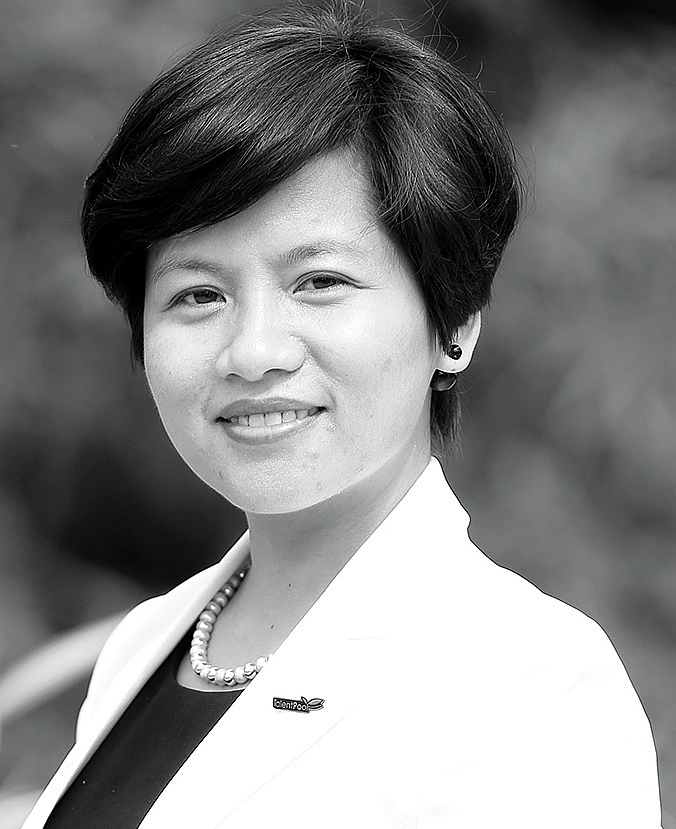Vietnamese women are creating new values
 |
| Nguyen Thi Le Na has followed her love and passion leading to the establishment of the Vinh orange ecological village |
| Woman power riding high in ethnic minority communities |
| A trailblazing contribution to equality |
Coming from Buoi village, a Westlake area in Hanoi which used to be famous for weaving handicraft known as linh, 59-year-old Vu Thi Minh Hoang still has a flaming passion for the product. Linh is one of dozens of Vietnamese traditional woven items made of high-quality silk.
“I believe that each area has its own unique natural products and I always buy them when I travel. In the early 2000s, I often bought high-quality foreign silk, but my aunt told me that they couldn’t compare to those of our ancestors’ linh,” Hoang told VIR.
Her aunt’s words urged Hoang to study the handicraft and in 2004, in spite of working for a big multinational group involving lots of travel, Hoang decided to study and find a way to revive the product.
“Luckily, I was supported and encouraged by my husband, family, and friends. They believe that I can do what I love. They helped me find weavers, particularly the 86-year-old artisan Phung Van Thiem who was the only living linh-weaving artisan at the time,” Hoang said.
After three years of studying weaving techniques, searching for the material, and piloting products to bouts of failure, in 2007 she was full of joyful tears when Thiem said, “This is Buoi’s linh.”
“Thiem was also very happy. He told me that he wove the last metre of linh in 1947. Many times I wanted to give up, and although I revived the ancestors’ handicraft because of my passion, the time and money it cost bored me. Besides that, consumers were not interested in the products at that time. But I received big encouragement from my husband and relatives,” Hoang said.
Understanding that diligence is the mother of success, Hoang’s linh product has been step-by-step welcomed by both Vietnamese and foreign consumers. In 2017 during a working visit to Vietnam, the Emperor and Empress of Japan chose linh as a typical Vietnamese product to take home.
“It was a piece of luck for linh. And I am even happier that I can send a message of uniqueness, convenience, and environmental friendliness in Vietnamese fashion through my own designed collection,” Hoang said.
Around 15 years have passed since Hoang began her passion with linh. Attaining new customers, their encouragement increasing, has given her the strength to maintain that passion for the product.
“I am happy to revive our ancestors’ handicraft. It has nothing to do with gender. If men don’t do it, but women can, let them do it. Now, the young generation and young designers are also interested in natural products, including linh. I believe linh, and other natural handmade products, will remain alive despite the many remaining obstacles,” Hoang explained.
New venture
Another case with a totally different background but with the same hint of keeping ancestor methods alive involves Nguyen Thi Le Na. Graduating from the Journalism and Communication Academy and after five years of working in Hanoi, 27-year-old Na decided to give up her childhood dream of becoming professional in public relations. She returned to her hometown of Vinh city in the central province of Nghe An to support her parents with their orange farm. At the time, Na’s parents often had to dump fruit as supply was higher than demand. Buyers were just a few, while the prices were too low, and some crops were unstable due to the unfavourable weather.
“At the beginning, I just wanted to help parents sell oranges. But the more I helped my parents, the harder I tried to solve the issues, then the deeper I ventured into the field,” Na told VIR. “When I saw farmers overuse chemicals in farming, I was really afraid that Vinh’s specialty would one day disappear. Chemicals not only make the fruit unsafe but the trees get weak, the soil degrades, and the orange quality declines. I started to learn about orange trees, and then I came to love and be passionate about it.”
In 2013, Na established her own enterprise to help stabilise the sale of oranges. Besides that, she bought five hectares of land from her parents and neighbours to implement organic farming.
“Many people, including my relatives, advised me to give up. Some said that as a woman, I should not work too much or my husband will get bored with me. Others said that I was too ambitious. Many people even believed that it would be too difficult for me,” Na shared about the early days. “It seems that whatever women do gains extra unwanted attention.”
Na did face a lot of difficulties in her farming journey, mostly in terms of capital and methods. However, the bias and the obstacles could not break Na’s spirit. She buried herself in books, and spoke to farmers as well as domestic and international experts in order to find the best process for her farm.
“We aim to build ecological orange farms without chemicals which self-operate and self-regenerate energy. We are using both organic compost and intercrops to create natural nutrition for trees,” Na said.
After six years of struggle, she has now changed the mindset of farmers in her region. From a farming household, she has become a companion and champion of farmers in building and developing Vinh orange ecological village.
“We have guided, trained, and connected with nearly 30 households to replicate the ecological model. Besides these, we built a small processing workshop to create dried orange products,” Na said. “Now, my firm has 11 key employees, five full-time workers, over 10 seasonal workers, and more than 50 associated farmers. Most of their income is about VND5 million ($217.4) per month, excluding VND1-2 million ($43.5-87) per month for extra work in the peak season.”
Unlike an ordinary farmer, Na has thought of more tasks to carry out. Now, she and the whole farm are preparing for 10 startup tours for agricultural investors next year. And in 2019, she successfully held two ecological tours for non-nationals at her farm.
Such people have been so enamoured with her farm that they want to voluntarily work there. Na’s brainpower and kindness eventually told her that it was time for her to hold free English classes for her workers’ children as well as other children in her neighbourhood. “There are two classes with about 20 kids per each. Many of them have been able to confidently communicate and understand what the teacher says because conversations in classes are entirely in English.”
It seems that inside this one woman, there is no tiredness and no discouragement, but just ideas, work, and devotion. With spirit, knowledge, and passion, Na is not only spreading her hometown specialties to the world but also making her hometown and the agricultural field better in an environmentally-friendly way.
 |
| Do Thuy Duong introducing her projects to domestic and foreign partners |
Entrepreneur and politician
If Na is having a profound impact on farmers and on children in her neighbourhood, then TalentPool JSC founder Do Thuy Duong is considered the person helping people achieve their dreams.
After graduating from Hanoi Foreign Trade University in 2001, and after years of gaining experience at domestic and international corporations, Duong founded TalentPool in 2006 specialised in human resources development.
“I started my business because I want to bring management technology, updated leadership thinking, and effective working capacity from the most developed countries to Vietnam,” Duong said.
After over 10 years, TalentPool has contributed a lot to Vietnamese businesses in a sustainable development roadmap, developing business strategies, corporate culture, and building a high-performing team.
“How to effectively apply scientific management tools always urges me to find ways to bring knowledge and capacity to many small- and medium-sized enterprises (SMEs) and to contribute to developing appropriate institutional policies to increase labour productivity, build a good foundation for startup activities, and assist businesses facing difficulties,” Duong added.
Besides this, the unemployment rate and quality of education and labour also made her concerned. As a result, Duong has spent her life attempting to improve the entrepreneur community.
In recognition of her contribution, the Vietnam Chamber of Commerce and Industry, the Vietnam Women Entrepreneurs Council, and the Hanoi Association for Women Entrepreneurs have awarded her assorted female entrepreneur awards.
Not only that, in 2016, at the age of 36, Duong became one of the youngest people elected as a member of Hanoi People’s Council for the 2016-2021 tenure.
“Over the years, the Vietnamese government has paid much attention to developing SMEs. This orientation is suitable with my expectation and the business community. The concerns about labour, markets, and education have become a strong motivation pushing me to engage in politics,” Duong said.
According to her, venturing into social activities is the way to be part of the foundation of common benefits. “There is no limit preventing us from discovering ourselves. I commit to improvement of education and medical quality towards to enhancing Hanoi people’s lives,” Duong added. “I have responsibility to try my best to maintain the belief of voters in me. It’s not for myself, but for young generations and the women that have been accompanying me.”
As the co-author of the book Ba Trieu’s 21st Century Daughters, which detailed the stories of 20 female leaders in different fields, Duong said,
“The interesting common point of these women is that they are all pioneers, willing to make new things, remain persistent with their choices, and trying to better themselves each day.”
 |
| Hoang has revitalised Hanoi’s traditional linh which is known far and wide |
Positive signs for women
In fact, the stories of these three entrepreneurs are just among many others in Vietnam’s society, where the role of women has been enhanced in all sectors, including politics.
Specifically, according to a report on the result of 10 years of implementing the Law on Gender Equality recently released by the Ministry of Labour, Invalids, and Social Affairs (MoLISA), in the political field, the rate of female Politburo members and members of the Central Committee of the Party has increased over three consecutive terms. For the first time, there has been a female National Assembly (NA) chairwoman and three female Politburo members.
The rate of women in the NA reached 27.1 per cent, higher than the global average of 23.4 per cent and the Asian average of 18.6 per cent.
This also marks the highest over the last two terms, of which 88 women were elected for the first time. A total of 41 female delegates are under 40 years old, while 41 female deputies are from ethnic minorities.
“Vietnam’s rate of female NA deputies is higher than other regional countries, one of the elements that maintained our rank on the Human Development Index set by the United Nations Development Programme,” Ngo Thi Thu Ha, director of the Center for Education, Promotion, and Empowerment of Women told VIR.
However, Ha also said that although Vietnam has gender targets on women candidates and leaders in the Law on Election and National Strategy on Gender Equality, women’s roles are not always fully defined. “Most female leaders often hold less power or advisory positions for the chiefs. In addition, the quality of women participating in public affairs is not high,” she explained.
In the economics, according to the MoLISA report, the proportion of female-owned enterprises also increased from 4 per cent in 2009 to 27.8 per cent in 2017, the highest in Southeast Asia.
Over the years, women have greatly contributed to the development of the Vietnamese economy. Last month, the NA passed the revised Labour Code, with a rise in retirement age. Accordingly, the retirement age for women will steadily increase from the current 55 to 60 by 2035, partly showing gender equality improvement in Vietnam.
“The rise in labourers’ retirement age is necessary to ensure employment rights and maintain a stable retirement in the context of increased life expectancy,” Ha said.
According to her, the issue needs to be considered in a thorough and multidimensional way. “Firstly, the retirement cap at 60 years does not apply to all occupations. Employees working in some hazardous industries will have the right to retire earlier. Secondly, labourers who work in a non-toxic environment still may retire before the age if their health and family conditions don’t allow and they have enough years of insurance in accordance with the law.”
These positive changes in empowering women in Vietnam over the past few years have been creating better environments for them to live, work, and contribute more to socio-economic development.
This has also helped those like Hoang, Na, and Duong inspire more Vietnamese women to create great values to the community.
What the stars mean:
★ Poor ★ ★ Promising ★★★ Good ★★★★ Very good ★★★★★ Exceptional
Themes: Empowering Women
- Female influence still to be attained
- Shaping Vietnam's corporate future: female board members show business excellence
- Nestlé Vietnam contributes to elevating the role of women across the supply chain
- Empowering female leaders in tech: insights and aspirations shared at KPMG Tech Innovator 2023
- Brighter Path programme hosts empowerment meeting for ethnic minority girls
Related Contents
Latest News
More News
- State corporations poised to drive 2026 growth (February 03, 2026 | 13:58)
- Why high-tech talent will define Vietnam’s growth (February 02, 2026 | 10:47)
- FMCG resilience amid varying storms (February 02, 2026 | 10:00)
- Customs reforms strengthen business confidence, support trade growth (February 01, 2026 | 08:20)
- Vietnam and US to launch sixth trade negotiation round (January 30, 2026 | 15:19)
- Digital publishing emerges as key growth driver in Vietnam (January 30, 2026 | 10:59)
- EVN signs key contract for Tri An hydropower expansion (January 30, 2026 | 10:57)
- Vietnam to lead trade growth in ASEAN (January 29, 2026 | 15:08)
- Carlsberg Vietnam delivers Lunar New Year support in central region (January 28, 2026 | 17:19)
- TikTok penalised $35,000 in Vietnam for consumer protection violations (January 28, 2026 | 17:15)



 Tag:
Tag:




















 Mobile Version
Mobile Version